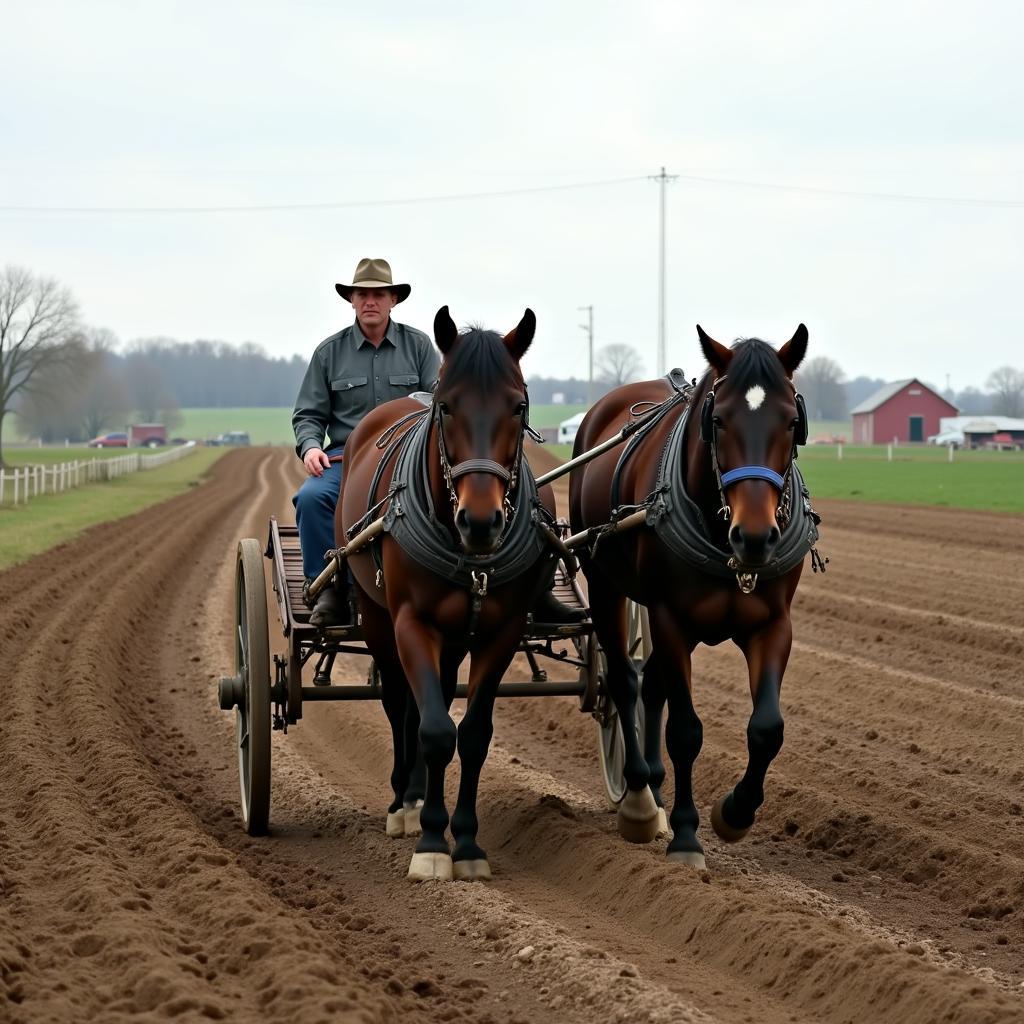Amish Horses are an integral part of the Amish way of life, embodying their commitment to tradition, practicality, and self-sufficiency. These powerful and gentle animals are more than just a means of transportation; they represent a deep connection to their heritage and a respect for a simpler way of living.
The Role of Amish Horses in Amish Society
Amish horses are essential for farming, transportation, and commerce within the Amish community. Their reliance on horse-drawn buggies instead of motorized vehicles is a visible symbol of their separation from the modern world. Choosing to use Amish horses demonstrates their commitment to a slower pace of life and a closer connection to nature. They believe this practice reinforces community bonds and emphasizes the value of hard work. You’ll often see Amish horses pulling buggies along country roads, transporting families to church, social gatherings, or markets.
 Amish Farmer Plowing Field
Amish Farmer Plowing Field
Common Breeds Favored by the Amish
While the Amish aren’t restricted to specific breeds, they generally prefer horses that are strong, dependable, and have a calm temperament. Popular choices often include sturdy draft breeds or crosses like Belgian, Percheron, and Suffolk Punch, as well as Standardbreds which are known for their endurance and gait suitable for pulling buggies. These Amish horses are well-suited to the demands of farm work and buggy travel, reflecting the Amish emphasis on practicality. You might be interested in learning more about buggy horses for sale.
Caring for Amish Horses: A Tradition of Respect
Amish horse care emphasizes practicality and humane treatment. Horses are viewed as valuable partners and are treated with respect. Their care reflects the Amish values of simplicity, hard work, and respect for nature. Feeding typically consists of hay, grain, and fresh pasture. Amish communities prioritize preventative care and often rely on traditional remedies, alongside modern veterinary practices when necessary. This blend of tradition and practicality ensures the well-being of their equine companions. Find out more about Amish and Horses.
Training and Handling Techniques
Amish horses are generally trained from a young age using gentle and consistent methods. The focus is on creating a trusting relationship between horse and handler. This approach emphasizes clear communication and positive reinforcement, resulting in well-mannered and reliable horses. For those interested in particular Amish horse breeds, we have information on Hershberger horses.
The Future of Amish Horses
Despite the encroaching influences of the modern world, the tradition of using Amish horses remains strong. The Amish understand the value of their heritage and continue to pass down their knowledge and skills to younger generations, ensuring the continued presence of these majestic animals in their communities. If you’re interested in owning one of these magnificent animals, you can find information about Amish Belgian horses for sale. For those looking for a unique gift, consider an Amish wooden rocking horse.
Expert Insight: Jacob Miller, Amish Farrier from Lancaster County, PA
“A good horse is a blessing. They are our partners in work and life, and we treat them accordingly.”
Expert Insight: Sarah Beiler, Amish farmer from Holmes County, OH
“Our horses are more than just animals; they are part of our family. We rely on them, and we care for them as we would any other member.”
Expert Insight: Eli Yoder, Amish harness maker from Daviess County, IN
“A well-made harness is essential for the comfort and safety of both horse and driver. We take pride in our craftsmanship, ensuring that every piece is made to last.”
In conclusion, Amish horses are much more than simply animals used for work; they represent a core element of the Amish identity and way of life. Their continued use symbolizes a commitment to tradition, hard work, and a deep respect for the natural world. Amish horses continue to play a vital role in Amish communities.
FAQ
-
What are the most common breeds of Amish horses? Standardbreds, Belgians, Percherons, and Suffolk Punches are popular choices.
-
Why don’t the Amish use cars? Their use of horse-drawn buggies reflects their commitment to a simpler life and separation from the modern world.
-
How are Amish horses trained? They are trained from a young age using gentle and consistent methods emphasizing trust and clear communication.
-
What do Amish horses eat? Their diet typically consists of hay, grain, and fresh pasture.
-
Are Amish horses for sale to the public? Yes, some Amish communities sell horses to the public.
-
What is the significance of the horse in Amish culture? The horse is a symbol of hard work, practicality, and a connection to their heritage.
-
How do the Amish care for their horses? They emphasize practical and humane treatment, incorporating both traditional remedies and modern veterinary practices.
Need more help? Contact us at Phone: 0772127271, Email: [email protected] or visit us at QGM2+WX2, Vị Trung, Vị Thuỷ, Hậu Giang, Việt Nam. We have a 24/7 customer service team.